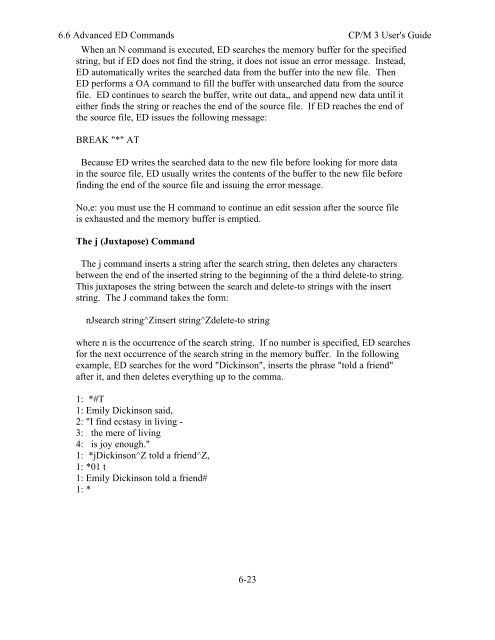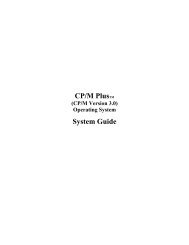DIGITAL RESEARCH(r) CP/M Plus TM (CP/M Version 3) Operating ...
DIGITAL RESEARCH(r) CP/M Plus TM (CP/M Version 3) Operating ...
DIGITAL RESEARCH(r) CP/M Plus TM (CP/M Version 3) Operating ...
Create successful ePaper yourself
Turn your PDF publications into a flip-book with our unique Google optimized e-Paper software.
6.6 Advanced ED Commands <strong>CP</strong>/M 3 User's Guide<br />
When an N command is executed, ED searches the memory buffer for the specified<br />
string, but if ED does not find the string, it does not issue an error message. Instead,<br />
ED automatically writes the searched data from the buffer into the new file. Then<br />
ED performs a OA command to fill the buffer with unsearched data from the source<br />
file. ED continues to search the buffer, write out data,, and append new data until it<br />
either finds the string or reaches the end of the source file. If ED reaches the end of<br />
the source file, ED issues the following message:<br />
BREAK "*" AT<br />
Because ED writes the searched data to the new file before looking for more data<br />
in the source file, ED usually writes the contents of the buffer to the new file before<br />
finding the end of the source file and issuing the error message.<br />
No,e: you must use the H command to continue an edit session after the source file<br />
is exhausted and the memory buffer is emptied.<br />
The j (Juxtapose) Command<br />
The j command inserts a string after the search string, then deletes any characters<br />
between the end of the inserted string to the beginning of the a third delete-to string.<br />
This juxtaposes the string between the search and delete-to strings with the insert<br />
string. The J command takes the form:<br />
nJsearch string^Zinsert string^Zdelete-to string<br />
where n is the occurrence of the search string. If no number is specified, ED searches<br />
for the next occurrence of the search string in the memory buffer. In the following<br />
example, ED searches for the word "Dickinson", inserts the phrase "told a friend"<br />
after it, and then deletes everything up to the comma.<br />
1: *#T<br />
1: Emily Dickinson said,<br />
2: "I find ecstasy in living -<br />
3: the mere of living<br />
4: is joy enough."<br />
1: *jDickinson^Z told a friend^Z,<br />
1: *01 t<br />
1: Emily Dickinson told a friend#<br />
1: *<br />
6-23




